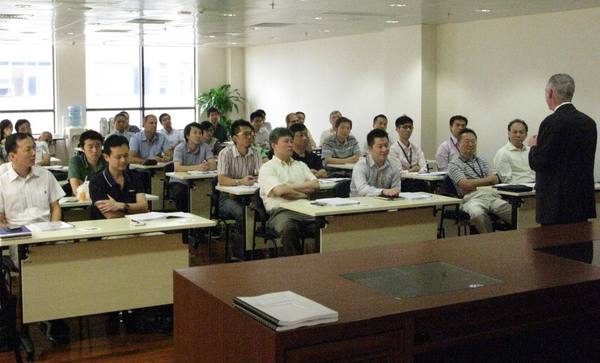
To develop the safety management concepts of the operators, and further ensure that the operators comply with the Macao aviation regulations and the Standards and Recommended Practices (SARPs) of International Civil Aviation Organization (ICAO) to implement their Safety Management Systems (SMS), the Civil Aviation Authority (AACM) organized an SMS course on 19 to 21 June 2012 and invited an ICAO expert to conduct training to the local airlines and the airport operators. The three-day course aimed at developing the knowledge of the participants on SMS concepts and also strengthening the importance of complying with the relevant Macao regulations on SMS and the ICAO SARPs to implement the different tasks in SMS. In addition, the operators should understand their responsibilities within SMS, and how SMS can enhance aviation safety, improve service quality and operation efficiency to ultimately deliver success to the company on the long run. The course was divided into 10 modules and was carried out in lectures, group discussions, practical exercises and case study tests. The main topics covered were SMS concepts, hazard and risk identification and management, safety management requirements in the annexes of the Convention on International Civil Aviation, relationship between State Safety Programme (SSP) and SMS, planning and implementation of SMS and so on. The speaker invited by AACM was the Chief Technical Advisor, Cooperative Development of Operational Safety & Continuing Airworthiness Programme – South East Asia (COSCAP-SEA), ICAO, Mr. Kim Trethewey, who is also the Project Coordinator and Flight Operations Expert in COSCAP-SEA. Mr. Kim Trethewey has enriching experience in lecturing SMS. He has been invited by Macao in the past to lecture similar topics and is familiar with the safety management environment in Macao. He is able to convey to the Macao participants the experiences in other countries as reference for application in Macao. The SMS course was conducted in AACM office with participation of more than 30 people, most of whom were management and technical staff responsible for flight safety, quality control, security and aircraft maintenance. These participants came from AACM, Air Macau Co. Ltd., East Asia Airlines Ltd., JetAsia Ltd., Macau Jet International Co. Ltd, Administration of Airports Ltd., and Menzies Macau Airport Services Ltd. To work together with the industry to strengthen the management of safety and create a good safety culture, AACM being the regulatory body in aviation safety in Macao organizes regular training courses for the industry to allow the latter to better understand Macao's aviation regulations, ICAO requirements as well as their own company responsibilities. AACM has already conducted a number of SMS courses lectured by ICAO experts for over 150 industry people. The SMS is a systematic approach to managing safety and is implemented by the airlines, maintenance organizations, air traffic service providers and airport operators. Its components include organization structure, accountability, policies and procedures. In compliance with the Convention on International Civil Aviation, Macau International Airport, all local airlines and the ground handler have implemented their respective SMSs in or before 2009. In addition to implementing SMS by the operators, AACM commenced the drafting of the Macao SAR Safety Programme (Macao SAR SSP) in 2010 and has since then devised the Macao SAR Safety Policy, the SSP Manual, the SMS Audit Guidelines and the SMS Requirements Update. As the Macao SAR SSP should interact with the operators' SMSs, AACM will collaborate with the operators to implement the two systems, with the objective of contributing to the long-term and effective management of safety in Macao.


